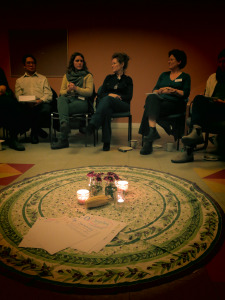In November 2013 we brought together 20 community gardeners for an evening of good food, good connections and good stories. On the team at the Our Food project we work with a range of community garden coordinators at elementary schools, universities, and community centers.
Though we get to see the similarities in the successes and challenges these hard working gardeners face, there is no place where they all connect. We saw value in offering that. So we stepped into this activity as a convener. To us this meant putting our time and resources towards creating a beautiful space with well thought out process that could facilitate meaningful connections and conversations.
Watch the video or read on:
The bigger picture purpose is to strengthen community gardens across Halifax. We picked storytelling as a way to allow for a deeper sharing of some gardeners experiences that could speak to everyone’s experience.
Process
Combining experiences with art of hosting and participatory action research methods, we created a process that would meet our needs and work well within a short timeframe (an evening event that most people could attend given schedules and commitments).
1. Intro: Short introduction to storytelling and the process. This includes the listening lenses. There are 4 lenses and each person picks one. The ones we chose to use were:
Pivotal Moments: What are the pivotal moments of breakthrough moments in this story? What can we learn from them?
Synchronicity & Magic: What were the moments of synchronicity and magic in the story?
Principles: What principles of working can be gleaned from this story?
Head & Heart: Which moments and decisions were led by the heart and which by the head? How did this impact the outcomes of the stories?
2. Storytelling: Each person has 5 minutes to tell their story (they had this information when preparing). Then a gentle musical alarm plays from my phone to signal 1 minute to wrap it up. After each story the group has 5 minutes to ask any clarification questions and to reflect back something they heard that had meaning. Again a gentle alarm rings to signal that section coming to a close. This process is repeated for each of the three storytellers.
This process worked very well. It felt like just the right amount of structure to help move things along, without feeling too heavy. This is the principle behind ‘liberating structures’.
3. Small group discussions: Then the group is split up into small groups based on their lens. They are encouraged to ‘host’ themselves by making sure everyone has a chance to speak and working to deeply listen to understand. The storytellers also gathered to share their experiences of being heard.
4. Share back: each group shares the themes they found. These are the themes we discovered together:
Community gardens are a place where:
A. We practice inclusion and integration, of diverse people and experiences.
B. We transform challenging situations into something awesome, bringing community together.
C. We foster friendship, a sense of community, a sense of purpose and community pride.
D. We meet people where they are at, and allow individuals to offer their own unique skills and gifts.
5. Then we finished the evening off by asking everyone to share what they thought was valuable about coming together and storytelling. Watch the video above to find out what was said.
The evening was a huge success. As the Our Food Project, we discovered a lot of power in being the convener–that using our time and resources to create containers for people in the food movement to come together and meaningfully connect has incredible ripple effects.
We are now planning our next event which is based on launching the 2014 spring/summer gardening season. We will focus on:
1) What are the main goals for your garden this season?
2) What are your strengths or skills you know you have?
3) What are the gaps or challenges you face?
4) Creating an asset map of garden leaders across HRM
To learn more, check out the Halifax Garden Network.
To see more great videos of our work check out the Urban Ag Tour and the blog post.
Until next time!
Miranda Cobb, Research, Evaluation and Storytelling Coordinator of the Our Food Project
